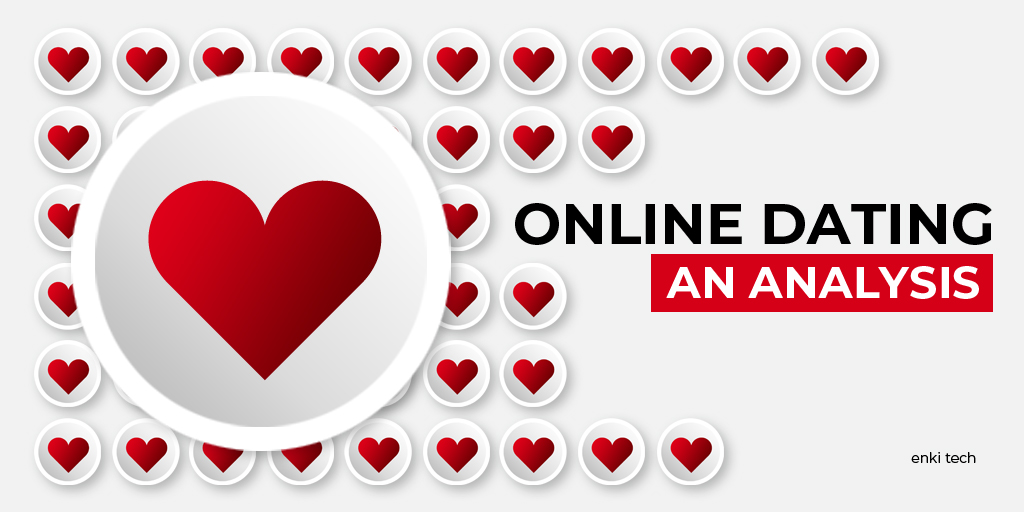
Technological advancement has had a significant impact on society and social interaction. The invention of the telephone shortened the time messages took to get across the country from a few weeks to a few minutes. The creation of the internet meant that individuals separated by borders and time zones could now connect with anyone anywhere. The internet’s rise caused a significant economic boom in the 1990s, which led to some of the most successful companies in the 21st century. With the internet came digital networks. With digital networks came another evolution in social interaction. And the change in human interaction in the digital age is no more evident than in the way we date each other.
Matchmaking is nothing new, but the internet has made it profoundly different. For centuries humans have engaged in the practice in both formal and informal ways.[1]
The first recorded “dating ads” appeared shortly after the invention of the newspaper in 1690. Before then, matchmaking was primarily left to family or influential community figures like village elders, priests, or rabbis. Prior to the 20th century, matchmaking and marriage were largely formal transactions predicated on ensuring family wealth and prosperity than love. But with the rise of the Civil Rights Movement and Sexual Revolution, the fight for gender equality, and women’s entrance into the formal workplace, the process of dating and marriage had begun to evolve into a more informal and personal experience. Women were no longer legally considered property. With the advent of birth control and the legalization of abortion, they had much more freedom and agency regarding family planning. As a result, casual dating became much more popular.
Rather than seeking the help of a religious leader or a village elder, individuals are increasingly turning to the internet for companionship and friendship. Currently, there are over 8,000 online dating sites and apps worldwide, and the number is only getting bigger. So how does online dating work?
Many online dating platforms claim to be infinitely better at creating better, more successful, longer-lasting relationships than traditional dating. And many online dating platforms claim to be able to achieve this through their unique matching algorithms. For most dating sites and apps, users can create an online profile and fill out a questionnaire of sorts that gives the platform some insight into who they are and what they are looking for. The information required from users may differ depending on the type of only dating platform they are using. The data given to the platform are then placed into an algorithm that then generates a series of “matches,” or a list of people who, based on their profile and the criteria you have for your companion(s), is an “ideal” match for them. With this matching algorithm, users can avoid the anxiety and frustrations of going out with a stranger. The platform takes your information and interests and automatically sorts through other profiles to find individuals you will presumably get along with better.
Over 50 million people worldwide [1] have tried or are currently active on an online dating platform, and over half of them view online dating positively. Online dating platforms have certainly opened the doors for people from more marginalized backgrounds to pursue new relationships and friendships. For individuals who identify as LGBTQIA+, online dating can allow them to interact with and meet other people in and outside of their community more safely, especially if they live in a society that is less than supportive of their sexuality/gender identity. Many online dating platforms are being created to curate individual users’ specific needs in the dating world. There are dating platforms for older singles, singles with kids, LGBTQIA+ singles, even singles who are farmers. In a 2018 study conducted by eHarmony, researchers discovered that 4% of U.S. married couples had met over the popular online dating platform. [3]
One of the most considerable benefits of online dating platforms is the increased options for potential dating partners. [4] Less than 50 years ago, most people dated people who lived in their immediate communities. Because of this the dating pool was often limited, and it is not unreasonable to assume that there were many people who settled for the partner they eventually chose. Online dating platforms have opened a whole new world of possibility to find individuals one truly connects with. Online dating platforms have increased the number of interracial, international, and same-sex relationships. Communicating online can also help those who are shyer in social situations to interact with others from the comfort of their homes. most people dated people who lived in their immediate communities. Because of this, the dating pool was often limited, and it is not unreasonable to assume that many people settled for the partner they eventually chose. Online dating platforms have opened a whole new world of possibilities to find individuals one truly connects with. Online dating platforms have increased the number of interracial, international, and same-sex relationships. Communicating online can also help those who are shyer in social situations interact with others from the comfort of their homes.
Of course, online dating is not without its flaws. Unlike traditional forms of dating, online dating can be very impersonal. However, appearance and physical attraction are important aspects of dating and building relationships, online dating platforms like Tinder or OkCupid hyper-emphasize it through features like “swiping,” where users “swipe” left or “swipe” right to accept or reject potential matches. At any given time, users are “swiping” through hundreds of profiles and, being inundated with that many options at once; it becomes easier to operate more mechanically rather than taking the time to get to know a single person. Swiping through profiles can make dating feel very robotic, and ultimately. 1 in 10 online daters quite after three months [5] There exists
a level of anonymity online that makes individuals much less likely to empathize with the person on the other end of the screen. Online bullying is not just a problem on social media networks.
Many individuals who engage in online dating experience discrimination against them for their body type, skin color, sexuality, etc. There are many stereotypes and false assumptions about race and gender regarding potential romantic partners in American society. For example, African American women are often stereotyped as mean and aggressive, whereas Asian women are stereotyped as docile and submissive. Both stereotypes are based on ignorant beliefs about race and gender linked to historical and modern instances of discrimination. Unfortunately, online interaction can encourage these latent societal biases. Many online daters report experiencing racism and sexism on the platforms they have used. Statistics show that for those seeking heterosexual dates on an online dating platform, black women and Asian men are the least likely to be contacted. Objectification and dehumanization on online dating platforms have also caused many users to view them negatively. Women are more likely to receive unwanted explicit sexual content and sexual harassment over an online dating platform. As a result, women tend to view online dating more negatively than men.
Social networks have yet to evolve enough to properly track those who use them to intentionally commit criminal and sexual offenses against others. With younger and younger generations growing up online, many parents rightfully worry about older individuals preying on underage kids over the internet. Though apps and online platforms exist to be exclusive for specific age groups, it is pretty easy to lie about one’s age online. There is also a risk of connecting with individuals with nefarious motives for adults engaged in online dating. Many online dating apps also rely on geolocation to find user matches in their area. Unfortunately, some people use these features to stalk people.
Overall, views of dating apps are mixed, but since their invention, dating apps have slowly become more popular. With any innovation, there are both positive and negative aspects to them. Most initial opinions of dating apps and online dating services were negative, as many viewed them as products for desperate people. But as our world and our social lives become increasingly digital, online dating platforms have grown to become the go-to way to meet and interact with new people. In addition, online dating and dating apps are firmly embedded into pop culture as the way to date in the 21st century. The question then becomes how we create safe digital environments for those seeking love online. To address the more negative aspects of the online dating world, some developers have begun to design online dating platforms and apps that encourage a safer digital environment for groups who experience more harassment on dating apps. And with hundreds of new dating apps being launched every year, the hope is that eventually, we will all be able to find our niche in the digital dating world.
[1] https://www.datingnews.com/industry-trends/online-dating-statistics-what-they-mean-for-future/
[2] https://www.datingadvice.com/online-dating/online-dating-statistics
[3] https://www.lovepanky.com/flirting-flings/dating-game/the-pros-and-cons-of-using-dating-apps-to-snag-a-date
[4] https://www.datingnews.com/industry-trends/online-dating-statistics-what-they-mean-for-future/



